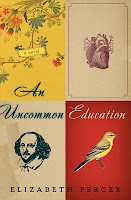On a trip to Boston earlier this week I finished a re-listening to Harry Potter & the Goblet of Fire. In the interest of full disclosure, I had started listening to my audio back in January, only to realize that my CD pack was missing the last sleeve of 4 CDs! What could be more frustrating?! Not wanting to spend the money to buy another set, I searched high & low for the missing CDs, and when that proved fruitless I asked around my friends and colleagues to see if anybody would let me borrow the last 4 CDs. Thankfully, my friend and colleague Victoria saved the day, which means I had 4 cds for four hours of driving to & from Boston and I was a very happy camper.
I think this was the last of Rowling's books that was truly well-edited (with the exception of the gaffe at the end during the Priori Incantatem scene); after this book her ego got out of control, unfortunately, and she produced far more chaff that wasn't edited out. GoF is both well-plotted and well-told and is the real turning point of the series. It marks the end of two eras: Harry's lost adolescence when the mantle of adulthood is thrust upon him far too early and the time when J K Rowling was not yet a household name. Yes, her series had grown in popularity rapidly after Harry Potter & the Philosopher's Stone, but it was during the three year publication gap between GoF and Harry Potter and Harry Potter & the Order of the Phoenix that the books became the must-read of the literary world, both for adults and children. Heretofore, the books had been published in rapid-fire succession, one every year, and that three year gap gave her worldwide readers plenty of time to catch up with the books if they hadn't been among the lucky few on the Rowling bandwagon from book one, onward.
If you haven't had the pleasure of listening to Jim Dale read these books, please do yourself a favor and beg, borrow, or steal one (well, maybe not steal). He voices each character differently and is quite brilliant. He even does many female voices well, and I think doing voices opposite one's own gender is a challenge for any reader. The one exception is the way he reads Hermione, both her voice and her name. It always sounds like "Her-MON-ee" and whenever Hermione speaks Harry's name, it comes out "Hare-eeeeee," extremely drawn out on the last syllable. But these are very minor criticisms in the face of the whole audio. Both Rowling's and Dale's version of Minerva McGonagall, for example, will leave readers and listeners longing for a much larger roll for the Transfiguration professor.
I think this was the last of Rowling's books that was truly well-edited (with the exception of the gaffe at the end during the Priori Incantatem scene); after this book her ego got out of control, unfortunately, and she produced far more chaff that wasn't edited out. GoF is both well-plotted and well-told and is the real turning point of the series. It marks the end of two eras: Harry's lost adolescence when the mantle of adulthood is thrust upon him far too early and the time when J K Rowling was not yet a household name. Yes, her series had grown in popularity rapidly after Harry Potter & the Philosopher's Stone, but it was during the three year publication gap between GoF and Harry Potter and Harry Potter & the Order of the Phoenix that the books became the must-read of the literary world, both for adults and children. Heretofore, the books had been published in rapid-fire succession, one every year, and that three year gap gave her worldwide readers plenty of time to catch up with the books if they hadn't been among the lucky few on the Rowling bandwagon from book one, onward.
If you haven't had the pleasure of listening to Jim Dale read these books, please do yourself a favor and beg, borrow, or steal one (well, maybe not steal). He voices each character differently and is quite brilliant. He even does many female voices well, and I think doing voices opposite one's own gender is a challenge for any reader. The one exception is the way he reads Hermione, both her voice and her name. It always sounds like "Her-MON-ee" and whenever Hermione speaks Harry's name, it comes out "Hare-eeeeee," extremely drawn out on the last syllable. But these are very minor criticisms in the face of the whole audio. Both Rowling's and Dale's version of Minerva McGonagall, for example, will leave readers and listeners longing for a much larger roll for the Transfiguration professor.



















